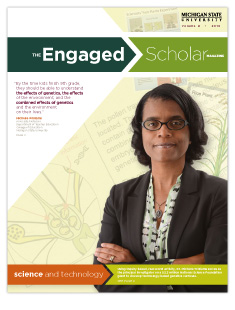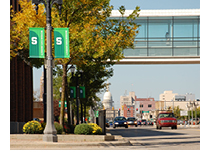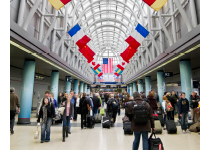|
The Engaged Scholar Magazine

Science and Technology
Volume 8 features Science and Technology research and collaborative partnerships at Michigan State University.
Announcements
Hiram Fitzgerald Named to Academy of Community Engagement Scholarship
Neoliberalism and Public Higher Education
Proposal Deadline: December 15, 2014
T-Summit 2015
Proposal Deadline: December 15, 2014
Innovations in Collaborative Modeling
Proposal Deadline: December 19, 2014
Journal of Public Scholarship in Higher Education
Call for Manuscripts Deadline: February 1, 2015
Transformations in Higher Education: The Scholarship of Engagement Series
Available from MSU Press
Tools of Engagement Learning Modules
Online curriculum modules are available for use by MSU faculty to introduce undergraduate students to the concept of university-community engagement.
MSU Graduate Certificate in Community Engagement
Program prepares graduate students for academic careers that integrate scholarship with community engagement. It offers students a transcript notation indicating that they have completed the program.
Like this e-Newsletter?
Subscribe to The Engaged Scholar E-Newsletter
|
|
|
|
In This Issue
Featured MSU Engaged Scholars
MSU Priorities
In Every Issue
|
Featured MSU Engaged Scholars
|
 Norbert E. Kaminski, Ph.D.
Norbert E. Kaminski, Ph.D.
Professor, Department of Pharmacology and Toxicology
Director, Center for Integrative Toxicology
College of Human Medicine
College of Veterinary Medicine
Engaging the Saginaw Bay Community Around Dioxin Contaminant Cleanup
The Tittabawassee River in Michigan's Saginaw Bay area is a site of significant contamination with a class of environmental pollutants termed dioxin-like compounds. Production practices routinely used to manufacture certain chlorinated compounds during the early and mid-1990s resulted in the unintentional generation of varying levels of dioxin-like compounds that ultimately contaminated the sediment of the 20-mile-long river. This contamination can lead to animal and human exposure to dioxin-like compounds.
"The dioxins associated with the river bottom sediment can be transferred up the food chain as larger organisms consume smaller organisms," Kaminski explained in user-friendly fashion. "For example, micro-organisms are eaten by small fish; small fish are eaten by bigger fish. Those that consume fish from the Tittabawassee River can be exposed. To avoid exposure to potentially harmful levels of these contaminants, the Michigan Department of Environmental Quality sets fish advisories to provide guidance on game fish consumption from the river."
Kaminski leads an interdisciplinary team of more than 25 investigators from MSU, the Hamner Institutes for Health Sciences, State University of New Jersey, Rutgers University, Purdue University, University of Texas A&M and the U.S. Environmental Protection Agency ... read more
 John Monberg, Ph.D.
John Monberg, Ph.D.
Assistant Professor, Department of Writing, Rhetoric and American Cultures
College of Arts and Letters
Our Michigan Avenue Corridor Project Builds Strong Community Connections
The rapid rise of technology is dramatically affecting how people learn, work, and function in their everyday lives. These developments are occurring in a relatively brief amount of time as it relates to historical perspective. The World Wide Web celebrated the 25th anniversary of its founding in March 2014. Facebook celebrated its 10th anniversary the month before, in February. Twitter is eight years old. Instagram is not yet four.
John Monberg conducts engaged research that addresses the impact of technology in society. This includes new media and public deliberation, globalization and the creative economy, and practices of research design.
"My work focuses on new resources, and the new kinds of infrastructures needed for community deliberation adequate to meet the challenges of globalization," said Monberg ... read more
MSU Priorities
Community and Economic Development in the 21st Century
|
 Mark S. Johnson
Mark S. Johnson
Professor of Practice, Department of Finance
Eli Broad College of Business
Arjun J. Singh
Professor, The School of Hospitality Business
Eli Broad College of Business
Scientific Evidence Points to Positive Impacts of the Federal Travel Promotion Act
When the Travel Promotion Act of 2010 was signed into law by President Barack Obama it was widely regarded as controversial. Two MSU researchers and a Cornell University researcher, coming from different directions regarding the potential impacts of the legislation, worked together to create and implement a scientifically measurable evaluation that addresses the 2010 Act and its impact on the hospitality industry and international tourism in the United States.
Mark Johnson focuses on the impact of government regulations on the market value of firms. He teaches about mergers and acquisitions, corporate finance, derivative asset pricing, and the market for corporate control.
His MSU colleague, A.J. Singh, is a leader in the field of solutions for issues and problems related to international lodging operations and the U.S. lodging industry ... read more
Upcoming Events
Detroit Resurgent Photography Exhibit
Detroit, Michigan
September 18 - December 31, 2014
Write Winning Grant Proposals Workshop
East Lansing, Michigan
January 8, 2015
MSU Awards Convocation
East Lansing, Michigan
February 10, 2015
Citizen Science 2015
San Jose, California
February 11-12, 2015
T-Summit 2015
East Lansing, Michigan
March 16–17, 2015
Neoliberalism and Public Higher Education
East Lansing, Michigan
March 27–28, 2015
MSU Science Festival
East Lansing, Michigan
April 15-19, 2015
Michigan Science Olympiad State Tournament
East Lansing, Michigan
May 2, 2015
Innovations in Collaborative Modeling
East Lansing, Michigan
June 4-5, 2015
16th Annual Conference of the Engagement Scholarship Consortium
State College, Pennsylvania
September 29-30, 2015
Looking for Project Partners?
University-Community Partnerships
Collaboration and partnership with communities are at the core of engaged scholarship. In all of its work, University Outreach and Engagement emphasizes university-community partnerships that are collaborative, participatory, empowering, systemic, transformative, and anchored in scholarship. If you are a faculty or academic staff member wanting to establish a partnership with community partners to work on a specific research issue, University Outreach and Engagement can help you. Our University-Community Partnerships (UCP) staff, specialists, and researchers have established connections across the state in a number of areas such as education, mental health, human services, business, and government. For more information, contact Bob Brown at (517) 432-1450 or brownr23@msu.edu.
Focus: HOPE, Detroit, MI
Opportunities for partnership exist around the following areas: Service-Learning, Student Internships and Placements, Faculty Research Partnerships, and Development of Innovative Solutions to Pressing Social Problems. For more information, contact Deborah E. Fisher at (313) 494-4306 or fisherd@focushope.edu, or visit http://ucp.msu.edu/partnerships/.
ES 360° Feedback ...
We would like to hear from you. Contact us with comments, suggestions, announcements, or “engaged scholar” project information for future e-newsletters. Send to Carla Hills: engaged.scholar@msu.edu or call (517) 353-8977.
|
|